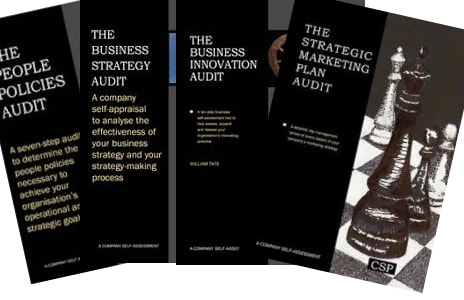Cambridge Strategy AuditsStrategy & General Management
The Business Innovation Audit The Business Strategy Audit The Corporate Culture Audit The Cost of Quality Audit The Organisation Shadow-Side Audit The Productivity Audit Human Resources The Employee Motivation Audit The Human Resource Function Audit The Organisational Change Audit The Performance Management Audit The Reward and Benefits Audit The Teams Audit The Training and Development Audit Marketing and Customer Service The Customer Loyalty Audit The Customer Satisfaction Audit The Strategic Marketing Plan Audit |
How Cambridge Strategy Audits WorkCambridge Strategy publishes 16 non-financial, company self-assessment audits - all ready-to-run in your organisation (see a full list on the left). Many of them include some questionnaires which can be scored but most of the questionnaires are templates which can be adapted to suit the exact needs of your business. They cover three functional areas - Human Resources, Marketing, and Strategy & General Management.
Most of the audits are about 100 pages long. Each begins with an Executive Summary and includes a 24-page section on conducting an audit (who to include in the audit team, how long it will take, how to analyse and share the results, etc). Each audit is presented as a series of steps, to make it as easy as possible for the individual or team running the audit to do so quickly and easily. The early steps of each audit usually involve some research and discussion to make sure that you know exactly what you are auditing and why. Subsequent steps focus on a particular area or process and will include detailed audit questions. These can be presented in several different forms. If personal interviews with staff members, customers or others have been suggested, you will normally find a sample interview sheet. In other cases you may find questions for a written survey or more detailed questions on a particular function or process which need to researched and answered. Lastly, you will find guidance on pulling together the audit results, presenting them, drawing conclusions and then building an action plan for improvement. Why you should use Cambridge Strategy Audits Executives worldwide use these audits to gather more complete information about the departments and processes which they manage and to help their organisations compete more effectively. They provide the ideal way to:
Who should conduct these audits? Each audit contains full guidelines on selecting and briefing the audit team. As a general rule, the audit team should be made up of 3 or 4 people who will work together. If your organisation already has process improvement teams or problem solving teams in place, these may serve very well as audit teams. The team will normally co-opt one further member from the department or process being audited - this person will bring additional detailed knowledge to the audit team. None of the audits requires any particular financial skills or training and the team need not include anyone from the finance/audit department. However, financial audit skills include knowledge of interviewing and investigation techniques and these may be helpful if they are already available in your organisation. So, some companies use an existing audit department to conduct their management audits, while others create entirely new teams. Each audit includes all the preliminary briefing materials needed by the audit team - there is no need for any external consultancy or training whatsoever (unless you feel it necessary to give the team some team-building training at the outset). |

